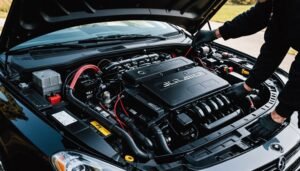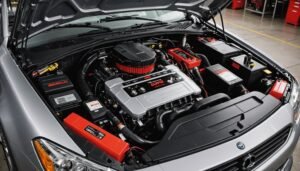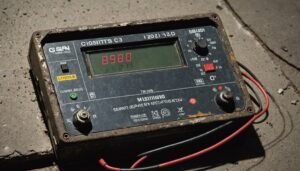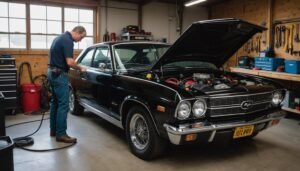If you’re considering wrapping your car, you’re likely wondering about the costs involved. Wrapping isn’t just a cosmetic upgrade; it can serve to protect your vehicle’s paint and make a bold statement. However, prices can vary considerably based on several factors. Understanding these nuances is crucial for making an informed decision. What specific elements should you keep in mind to guarantee you get the best value for your money? Let’s explore.
Key Takeaways
- The cost to wrap a car typically ranges from $2,000 to $5,000, depending on factors like size and design complexity.
- High-quality vinyl materials offer better durability and vibrancy, influencing overall costs significantly.
- Larger vehicles require more materials and labor, resulting in higher wrap costs compared to smaller cars.
- Geographic location and the experience of the installer can impact pricing for car wraps.
- Look for seasonal discounts and promotions on social media to find cost-effective wrapping options.
Understanding Car Wraps: What Are They?

Car wraps are versatile solutions for transforming your vehicle’s appearance without the permanence of a paint job. Fundamentally, a car wrap is a vinyl film that adheres to your vehicle’s surface, allowing you to change colors, add graphics, or create unique designs without committing to a full repaint. You can easily personalize your vehicle‘s look to reflect your style or brand.
These wraps come in various finishes, like matte, glossy, or textured, giving you a broad range of options. When applied by professionals, a wrap can provide a seamless and eye-catching appearance that turns heads. Plus, it protects the original paint underneath, shielding it from UV rays and minor abrasions.You can learn more about how-much-is-it-to-tint-car-windows
If you decide to remove the wrap, you’ll find the underlying paint often remains intact, making this an economical and reversible option for car customization. Understanding car wraps helps you make an informed choice about your vehicle’s appearance.
Factors Influencing the Cost of Wrapping a Car

When considering the cost of wrapping a car, several key factors come into play that can greatly influence the final price. First, the type of vinyl you choose can greatly impact your budget; higher-quality films often come with a higher price tag but offer better durability and finish. Next, the complexity of the design plays an essential role—custom graphics and intricate patterns require more time and skilled labor, driving up costs.
Additionally, the geographic location of your wrap provider matters. Labor prices can vary widely between regions, and urban areas might charge more. Finally, the experience of the installer can also affect the price; seasoned professionals might charge a premium for their expertise, but their work often results in a better application and longevity of the wrap. Evaluating these factors will help you make an informed decision that fits your needs and budget.You can learn more about how-much-does-it-cost-to-tint-car-windows
Vehicle Size and Its Impact on Pricing

As you consider wrapping your vehicle, keep in mind that the size of your vehicle directly influences the overall cost. Larger vehicles, like SUVs and vans, require more material, which increases the price. In contrast, a compact car will generally demand less vinyl, resulting in a lower cost.
However, it’s not solely about material usage. Wrapping larger vehicles involves more complex labor and detailed work. Curves and extensive surface areas on bigger vehicles can complicate installation, adding to the labor cost. On the flip side, smaller vehicles are often quicker and easier to wrap, saving both time and money.
Materials and Quality: The Cost Difference
While you might think that all vehicle wraps are created equal, the materials used can greatly affect the cost and quality of the final product. High-quality vinyl wraps, for instance, offer vibrant colors and durability, which typically raise the price. Cheaper materials may save you money upfront, but they often lead to quicker wear and tear, fading or peeling over time.
You’ll also notice a difference in adhesive strength. Premium wraps stick better and can withstand weather conditions, reducing the risk of bubbling or lifting. Additionally, thickness plays a role; thicker films provide more protection and a better finish, enhancing the overall look.
When budgeting for a wrap, consider not just the upfront cost but the long-term value. Investing in high-quality materials may initially be pricier, but it can save you from costly repairs or replacements down the line, ensuring your vehicle looks its best for years to come.You can learn more about how-many-axles-does-a-car-have
Design Complexity: How It Affects Total Cost
The complexity of your design plays a significant role in determining the overall cost of wrapping your car. If you choose a simple, solid color, your expenses will be lower. However, opting for intricate patterns, logos, or multi-color designs can drastically increase costs. This increase stems from the additional time and skill required to apply complex wraps accurately.
Moreover, detailed designs often need higher-quality materials to guarantee they adhere well and maintain their appearance over time. If the design includes curves or contours, it may take longer to apply, leading to higher labor costs.
It’s essential to balance your creative vision with your budget. While a striking design can enhance your vehicle’s attractiveness and branding, remember that the more elaborate the design, the higher the potential cost. Carefully consider how much complexity you really need and how it aligns with your overall goals for the wrap.
Professional Installation vs. DIY Wrapping
Choosing between professional installation and DIY wrapping can significantly influence your budget and the final outcome of your car wrap project. While DIY might seem like a cost-effective option, it requires skill and experience to achieve that seamless finish. On the other hand, professional installers bring expertise but at a higher price point.
| Aspect | Professional Installation | DIY Wrapping |
|---|---|---|
| Skill Level | High | Varies (often low) |
| Cost | Higher | Lower |
| Time Required | Quick | Lengthy |
| Final Finish | Flawless | May have imperfections |
Ultimately, if you want a flawless outcome and have the budget, consider professional installation. If you’re up for a challenge and want to save money, DIY might be the way to go. Weigh your options wisely!
Additional Costs to Consider
When planning a car wrap project, it’s easy to focus solely on the cost of the vinyl material and installation, but don’t overlook the additional expenses that can sneak up on you. First, consider the cost of vehicle preparation. You might need to clean, polish, or repair the surface to guarantee the wrap adheres properly. Also, factor in the price of design services if you want a custom look; hiring a professional designer can elevate your project.
Don’t forget about the potential for removal costs down the line. Removing a wrap improperly can damage your paint and lead to costly repairs. Additionally, if you live in an area with regulations around vehicle advertising, permits or fees may apply. You’ll want to include maintenance expenses like cleaning products specifically designed for wraps to keep your investment looking fresh. These extra costs can add up, so plan wisely!
Average Price Range for Car Wraps
As you explore options for wrapping your car, it’s essential to understand the average price range, which can fluctuate based on several factors. Typically, you can expect to pay between $2,500 and $5,000 for a full car wrap. However, costs can vary depending on the vinyl quality, design complexity, and labor involved.
| Car Wrap Type | Average Cost |
|---|---|
| Full Vehicle Wrap | $2,500 – $5,000 |
| Partial Wrap (1/2 Car) | $1,000 – $2,500 |
| Custom Graphics | $500 – $2,000 |
| Specialty Finish | $3,000 – $6,000 |
| Removal of Old Wrap | $400 – $1,000 |
Keep these figures in mind as you weigh your options. Knowing what to expect can help you budget effectively and deliver an impactful result for your vehicle.
Tips for Finding the Best Deals on Car Wrapping
Finding the best deals on car wrapping can save you a significant amount, especially after reviewing the average price ranges for various wrap types. Start by doing thorough research—compare prices online and check local shops. Don’t hesitate to request quotes from multiple providers; this helps you gauge a fair price. Look for reviews and recommendations to guarantee quality, as a cheap wrap isn’t worth it if it won’t last. Timing can also play a role; consider seeking discounts during off-peak seasons when shops want to attract more business. Additionally, inquire about package deals that might include design services or protective coatings. Finally, don’t overlook social media promotions—many shops offer exclusive deals or contests. By combining these strategies, you’ll not only find a great deal but also guarantee your car wrap looks fantastic!
Frequently Asked Questions
How Long Does a Car Wrap Typically Last?
A car wrap typically lasts between five to seven years, depending on several factors. If you maintain it well and park it in a garage, you might even extend its lifespan. Exposure to harsh elements like UV rays and extreme temperatures can shorten its durability. Cleaning it regularly with gentle products also helps. So, if you take care of your wrap, you’ll enjoy its vibrant look for years to come!
Can I Remove a Car Wrap Myself?
Yes, you can remove a car wrap yourself, but it requires patience and care. Notably, studies show that improperly removing a wrap can damage the paint underneath 30% of the time. Start by heating the wrap to soften the adhesive, working slowly to peel it off. Use an adhesive remover for any leftover residue. If you’re unsure, consider consulting a professional to avoid potential damage and guarantee a smooth removal process.
Will Wrapping Damage My Car’s Paint?
Wrapping your car doesn’t typically damage the paint underneath. If your vehicle’s paint is in good condition, removing the wrap should leave the factory finish intact. However, old, damaged, or poorly applied wraps might cause issues during removal. To minimize risks, you should let a professional apply and remove the wrap. Always test a small area first to see how your specific paint reacts, ensuring your car stays pristine.
Are There Color Options Beyond Standard Wraps?
When it comes to color options, you’re stepping into a rainbow of possibilities. Beyond the standard wraps, you can explore metallic finishes, matte textures, or even custom designs that reflect your personality. Think of it as painting your dreams on your vehicle. You’ve got choices like chrome, iridescent, or vibrant patterns that turn heads. So, release your creativity and transform your ride into a moving canvas that stands out on the road!
Can I Wash My Wrapped Car Normally?
Yes, you can wash your wrapped car normally, but take some precautions. Avoid automatic car washes with brushes, as they can damage the wrap. Instead, opt for a gentle hand wash with a soft sponge and pH-balanced soap. Rinse thoroughly and dry with a microfiber towel to prevent water spots. Regular cleaning not only keeps your wrap looking fresh but also extends its lifespan, so don’t forget to give your ride some care!



















